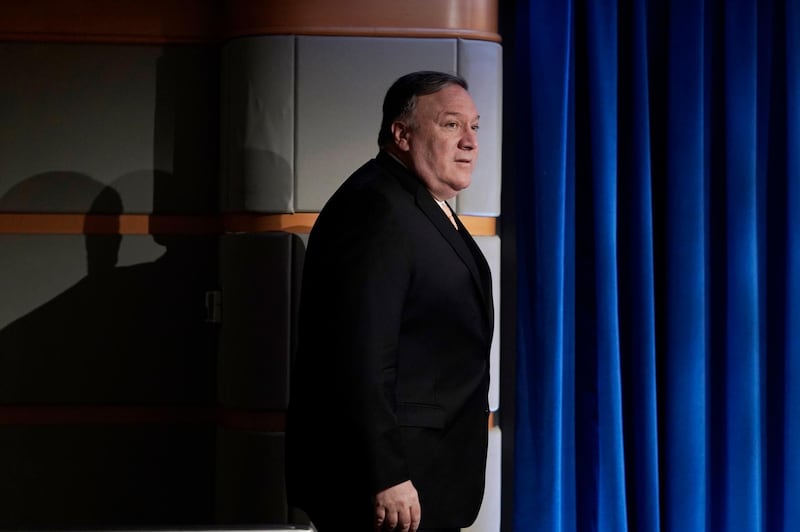The United States has watered down sanctions on Iran’s Revolutionary Guard by clarifying that foreign governments and businesses that do dealings with Tehran’s paramilitary force will not face travel bans.
When the administration of Donald Trump imposed the sanctions on April 15, there was a fear that military officials and US diplomats would have to cut contact with officials in countries that have dealings with Tehran and the guards force.
But on Wednesday, Secretary of State Mike Pompeo published two notices in the Federal Register clarifying that those that have dealings with the guards or their affiliates would not be subject to a ban on travel to the US.
The decision to directly apply sanctions on Iran's Revolutionary Guard and its proxies is the first time an arm of a foreign government has ever been designated a terrorist organization by the United States. They came as part of the American push to apply more pressure on Tehran over destabilising regional policies and its backing for militant and armed groups from Beirut to Aden.
There were concerns that without such an exemption, US relations with countries such as Lebanon or Iraq would be hit given Beirut and Baghdad’s close ties to Tehran.
In Lebanon, Iran and the guard are active in their support of the militant Hezbollah movement, and in Iraq they back Shiite militias and have close ties to the government. Both countries also have close relations with the United States.
Mr Pompeo said in the notices that he decided to waive the travel bans in US foreign policy and national security interests.
In one notice, he said the sanctions "shall not apply to any ministry, department, agency, division, or other group or subgroup within any foreign government" unless that entity is covered by existing US sanctions.
In the second notice, he said the sanctions would not apply "to any business, organization, or group, whether public or private, solely based on its provision of material support to any foreign government sub-entity that has been designated as a foreign terrorist organization."
The notices, one former US official said, was a pragmatic approach.
"At first glance, it looks like a wise carve-out," Daniel Fried, a former sanctions coordinator for the State Department who is now with The Atlantic Council, told the Associated Press. "One of the rules of sanctions is that you need to account for unintended consequences and have wide licensing and waiver authority. Otherwise, if there are unintended consequences you find yourself unable to act."
The notices come just days after the US decided to end sanctions waivers for countries reliant on Iranian oil in a move that Mr Trump said was aimed at bringing Tehran’s oil and gas exports to zero.
But, some Iran hawks in the US are concerned that the US administration may not fully enforce the sanctions on countries that continue to import Iranian oil.
AP reported that one of the scenarios being considered is to allow countries covered under the waiver to place orders for Iranian oil and gas before the May 2 deadline, essentially pre-purchasing supplies to be delivered at a later day. The AP said the plan was relayed by congressional aides and outside advisers familiar with the matter although there was no official mention of the proposal.
The AP also said that US officials had refused to rule out a soft implementation of the sanctions, giving countries time to taper off Iranian imports.
But US officials that vocal critics of Iran have been clear in their view of Mr Trump’s campaign of “maximum pressure” on Tehran.
"I think maximum pressure should mean maximum pressure," Senator Ted Cruz told Mr Pompeo earlier this month at a Senate Foreign Relations Committee hearing during which he implored the administration to adopt the strictest possible interpretation of the sanctions.
Senator Tom Cotton echoed his colleague’s comments. "Going forward, the proper amount of oil exports from Iran is zero."







